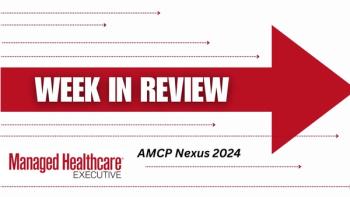
Popular menopause prescriptions such as Estradiol, Dotti, Premarin and Veozah will be available for cheaper using a GoodRx coupon.

Popular menopause prescriptions such as Estradiol, Dotti, Premarin and Veozah will be available for cheaper using a GoodRx coupon.

A panel of speakers demonstrated different ways technology and artificial intelligence (AI) could greatly expand access to glaucoma care.

This week’s approval expands Seldardsi indications to treat adults with Crohn’s disease and ulcerative colitis.

Changes have been proposed to the quality payment program that could have ups and downs, but not, perhaps for some, until 2029.

A new statistical models shed light on why some patients can extend the dosing interval with Eylea (aflibercept) from 8 weeks to as long as 20 weeks for neovascular age-related macular degeneration (nAMD) or diabetic macular edema (DME).

Stephanie Graff, M.D., FACP, FASCO, director of breast oncology at the Lifespan Cancer Institute and author of Investigating the Salience of Clinical Meaningfulness and Clinically Meaningful Outcomes in Metastatic Breast Cancer Care Delivery, shares the reasons why she chose to study metastatic breast cancer patients.

AI (artificial intelligence) can improve the accuracy of disease prediction by crunching volumes of existing clinical data on patients.

There is a need for strict policies regarding the use of AI in the managed care space, according to Douglas S. Burgoyne, Pharm.D., MBA, FAMCP, adjunct associate professor at the University of Utah College of Pharmacy.

Health plans and PBMs are using AI to aggregate data, summarize information and enhance their formulary decision-making processes, according to Douglas S. Burgoyne, Pharm.D., MBA, FAMCP, adjunct associate professor at the University of Utah College of Pharmacy.

Technology can help address the complexities of specialty medications by automating processes and enabling proactive interventions to ensure patients stay on their critical therapies, according to Kristen Whelchel, Pharm.D., CSP, Research and Patient Care Improvement Pharmacist with Vanderbilt Specialty Pharmacy's Department of Health Outcomes and Research.

Up to half of patients showed significant improvement in study results presented at the American Academy of Ophthalmology (AAO) annual meeting

Here’s what you missed this week on Managed Healthcare Executive.

In the threat versus opportunity session, Cecilia and Aaron Lee of the University of Washington staked out opposing positions.

Patients self-identified as members of the minority group that the study was designed to enroll, according to Jeremiah Brown, M.D., of Retina Consultants of Texas, one of the lead ELEVATUM investigators. The study will yield a "treasure trove" of data, Brown said.

Enrollment goals for the U.S. part of the phase 4, open-label study of Vabysmo (faricimab) were 45% Black participants, 45% Hispanic participants and 10% Native American, Pacific Islander and Native Hawaiian, said Jeremiah Brown, M.D., a lead ELEVATUM investigator.

Harmony Garges, M.D, senior vice president, chief medical officer and head of global medical at ViiV Healthcare, highlighted results of two real-world evidence studies of Apretude as an HIV prevention medication.

IJ Anosike, M.D., M.P.H., assistant professor of pediatrics at the Montefiore Medical Center in the Bronx, explains how COVID fatigue can lead to a downward trend in children getting the proper vaccines.

George O. Waring, IV, M.D., discusses the latest technology improving eyesight for patients.

Kristen Whelchel, Pharm.D., CSP, Research and Patient Care Improvement Pharmacist with Vanderbilt Specialty Pharmacy's Department of Health Outcomes and Research, explains how technology identifies at-risk patients, coordinates medication refills and more.

The FDA has already made more than a dozen cancer drug approval decisions this year and more expected in the next several months and in early 2025, according to Kaelyn Boss, who gave an oncology drug pipeline talk at the 2024 AMCP Nexus meeting this week.

Statins have had an evolving role in the management of cardiovascular risk in people living with HIV, explained Michelle Cespedes, M.D., M.S., professor of medicine, Icahn School of Medicine at Mount Sinai and Mount Sinai Health System.

David Joyner has been appointed president and CEO of CVS Health effective immediately.

Research might produce treatments of involving transplants with a few, selected types of bacteria tailored to an individual's microbiome.

Even people living with HIV who have undetectable viral loads experience elevated inflammation levels, explained Michelle Cespedes, M.D., M.S, of Mount Sinai Health System.

Large PBMs are removing Humira from some of their formularies. AMCP Nexus panelists still see challenges and a need for education and more attention to patient interests.

Crescent Moore, Ph.D., Pharm.D., Director of Part D/Pharmacy at BluePeak Advisors, highlights the expected shift of Medicare beneficiaries towards Medicare Advantage Prescription Drug (MA-PD) plans.

Crescent Moore, Ph.D., Pharm.D., Director of Part D/Pharmacy at BluePeak Advisors, explains the impacts of the upcoming changes to Medicare Part D.

An overview of the preapproval information exchange (PIE) from Charlie Dragovich, Senior Director and Client Strategist at Cencora

A benzodiazepine analog produced positive results in a mouse study.

Several companies are developing new drugs to treat transthyretin amyloidosis cardiomyopathy (ATTR-CM), a formerly obscure condition that is getting an increasing amount of attention.